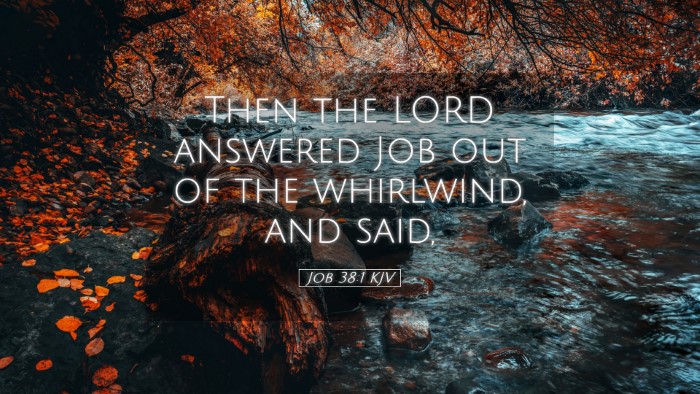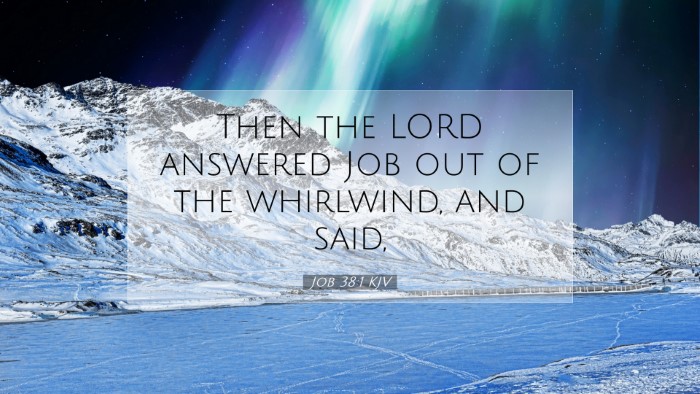Commentary on Job 38:1
Job 38:1: "Then the LORD answered Job out of the whirlwind and said..."
Introduction
The Book of Job is one of the most profound works in ancient literature, grappling with themes of suffering, divine justice, and the role of humanity in the grand scope of creation. In Job 38:1, we witness a pivotal moment—God speaks directly to Job after a long silence, underscoring the gravity of this moment in the text.
The Context of God's Response
Prior to this verse, Job has endured extensive suffering and has been engaged in deep conversation with his friends, who unsuccessfully attempt to explain the reasons for his afflictions. The silence from God sets a stage of tension—Job longs for an answer, wishing to plead his case before God.
According to Matthew Henry, Job’s friends' opinions reflect a limited understanding of divine justice which was a common notion in their theology. They perceived suffering primarily as a punishment for sin, therefore, Job’s insistence on his innocence posed a challenge to their beliefs.
The Significance of the Whirlwind
The phrase "out of the whirlwind" captures the magnitude of God's response. Albert Barnes emphasizes that the whirlwind symbolizes both God's power and His utter transcendence over the natural world. In this chaotic display, God demonstrates that human reasoning and understanding are limited when faced with divine wisdom.
Adam Clarke interprets the whirlwind as a demonstration of divine majesty. It presents an image of a powerful Force that commands the universe, reminding Job (and the readers) of the incomprehensible nature of God. This whirlwind serves as a prelude to the series of questions that follow, questions that call into question Job's understanding of creation and divine order.
God's Approach: Authority and Inquiry
God’s inquiry begins with a stark contrast: He does not provide answers in the way that Job expects. Instead, He questions Job, which serves to elevate God's authority and wisdom above human reasoning. Matthew Henry argues that this method of speaking to Job is purposeful—God seeks not only to challenge Job’s understanding but to deepen his faith.
Albert Barnes notes that God’s questioning approach invites Job and the audience to reflect on the profound mysteries of creation. It encapsulates the idea that divine wisdom often operates outside human understanding, encouraging believers to submit to God’s greater purpose.
Implications for Faith and Understanding
This pivotal moment in Job 38:1 serves as a reminder to both clergy and laity regarding the nature of faith amidst suffering. Adam Clarke suggests that Job’s ultimate response to God's questioning calls for humility, acknowledging the limitations of human perspective when confronted with divine sovereignty.
For pastors and theologians, Job’s experience initiated by this verse provides a framework for discussing theodicy—the justice of God in the face of human suffering. It presents an exploration of faith that does not always find neat, logical answers but instead finds itself enveloped in the mystery of God’s will.
Conclusion
In Job 38:1, when God answers out of the whirlwind, it signifies a turning point not only for Job but for humanity as it wrestles with the complexities of existence, suffering, and divine purpose. The insights gleaned from Matthew Henry, Albert Barnes, and Adam Clarke weave together a meaningful tapestry that highlights the strength of faith amidst existential inquiry.
This response invites readers to delve into profound contemplation of their relationship with God, understanding that while answers may elude, the presence and voice of God in our turmoil is a powerful foundation for growth and faith.


